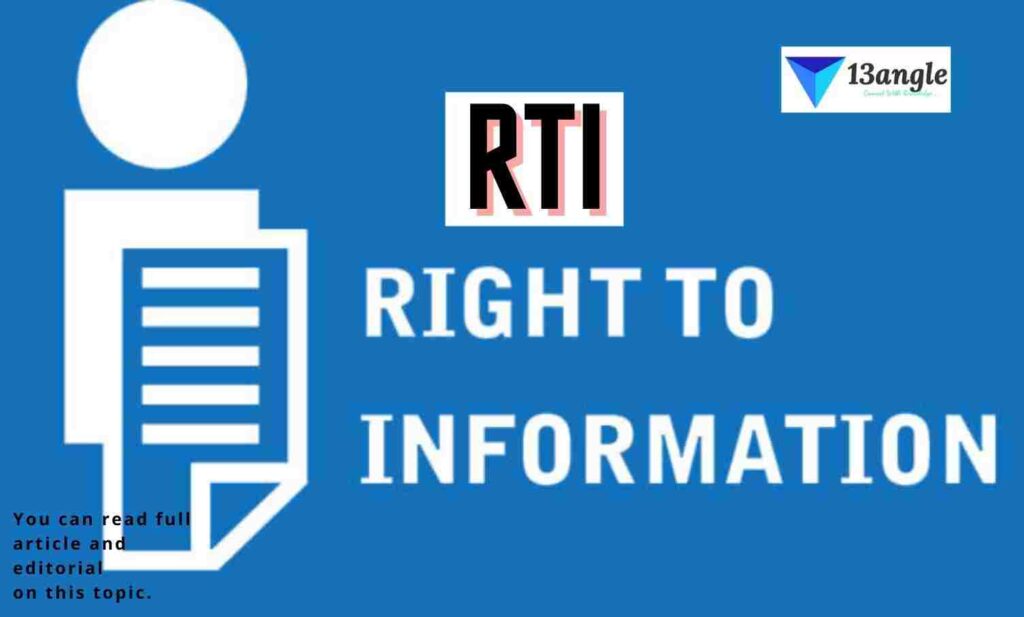It is the first time that a government’s initiative to change the RTI Act has been successful in Parliament. On July 19, 2019, Minister of State (MoS) in the Prime Minister’s Office Jitendra Singh introduced the RTI (Amendment) Bill, 2019, citing the government’s belief in “maximum governance, minimal government.” The bill, on the other hand, was heavily criticized by the opposition, the media, activists, and ordinary individuals, who accused the government of undermining citizens’ access to information. All of the protests were fruitless, as the opposition insisted that the bill be submitted to a Select Committee for further consideration. A similar attempt was made a year ago, but the bill was never introduced in parliament. Despite the outrage, the NDA government was able to enact the measure because it won an overwhelming majority in the 17th Lok Sabha.
The RTI Act is widely regarded as one of the country’s most progressive laws since independence. It contains a reflection of India’s dying democracy’s still-breathing vestiges. The right of citizens to question those in power is at the heart of any democracy. The cornerstone of democracy will be hollow at its core without debate and criticism. With approximately 60 lakh petitions filed each year, the Right to Information strengthens that basis and allows people to keep a check on governments’ arbitrary use of power. The RTI Act (Amendment) Bill, 2019, empowers the federal government to regulate the pay and working conditions of Information Commissioners at both the federal and state levels. The tenure of the central Chief Information Commissioner and Information Commissioners, which was previously set at five years (or until the age of 65, whichever comes first), will now be dictated by the central government by changing Section 13 of the RTI Act, 2005. The salaries and allowances of the central-appointed Chief Information Commissioner and Information Commissioners, which were previously set at the same level as the salaries and allowances of the Chief Election Commissioners and Election Commissioners, will now be set by the central government. Section 16, which deals with state-level Chief Information Commissioners and Information Commissioners, is similar. The grounds offered by the NDA government for proposing to limit RTI officials’ autonomy are dubious and troublesome. The federal government explained its position by claiming that the Information Commission is a statutory body that cannot be compared to the Election Commission, which is a constitutional authority. However, some of the NDA government’s past deeds, unfortunately, do not match its current words.
The Modi government upgraded the salaries, allowances, eligibility criteria, and manner of appointment of Chairpersons/Presiding Officers and Members of 19 Tribunals and Adjudicating Authorities Tribunals, including the Central Administrative Tribunal, National Green Tribunal (NGT), Armed Forces Tribunal, Appellate Tribunal for Electricity, Railway Claims Tribunal, Intellectual Property Appellate Board, and Debts Recovery Appeal Tribunal, according to the Finance Act (June 2017). It’s worth noting that each of these tribunals was created by a specific statute, and its members are not constitutional authority.
The wages of the Chairpersons of 17 of the 19 Tribunals were increased to match those of Election Commissioners, while the salaries of the members were raised to match those of High Court judges. It’s also worth noting that the Chief Election Commissioner and Election Commissioners are entitled to the same pay as Supreme Court of India judges ($2,25,000). However, when we looked into the salary they were receiving, we discovered that they were still being paid $90,000. It casts doubt on whether or not their pay has been increased. It’s also possible that the website’s information hasn’t been updated recently. Another fact that casts doubt on the government’s intentions is that the salaries of the Chairpersons and members of the above-mentioned Statutory Tribunals were increased even before the President of India gave his assent to the law that increased the salaries of constitutional authorities such as the Supreme Court and High Court Judges. And this statute was published in January 2018, six months after the Statutory Tribunals’ wages were raised. As a result, the government’s decision to increase the wages of statutory authorities before those of constitutional authorities highlights the wide difference between the government’s actions and rhetoric.
This amendment may potentially contravene Article 14 of the Constitution, which states, “The State shall not deny to any person equality before the law or equal protection of the law within the territory of India.” The Information Commission’s powers, like the other Statutory Tribunals and Adjudicating Authorities, undertake quasi-judicial functions. Treating them differently fails the “Intelligible Differentia” criteria, which allows unequal to be treated differently under Article 14. As a result, the new RTI Act modifications violate every citizen’s constitutional right to equal treatment under the law.
Intellectuals have been arguing and analyzing the threat of fascism to India for the past few years. But, with the stealing away of people’s right to hold the governing government accountable for its activities, it’s evident that it’s no longer on the verge of entering, but has already done so. No Question, No Dissent, and hence No Accountability thesis are the foundations of fascism. If we follow the Modi government’s steps since 2014, we can see how attacks on the independence of practically every democratic institution in the country have increased. India is destined to have a long fight to save the autonomy that it derives through its constitutional spirit.

For deep details, you can read the full article. Click the link below :





